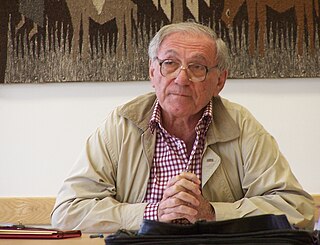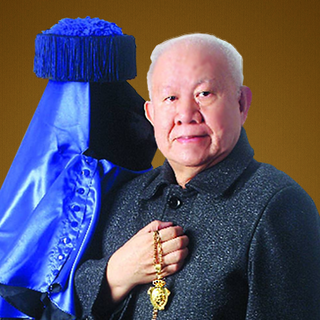Related Research Articles
African philosophy is the philosophical discourse produced in Africa or by indigenous Africans. African philosophers are found in the various academic fields of present philosophy, such as metaphysics, epistemology, moral philosophy, and political philosophy.
Kwasi Wiredu was a Ghanaian philosopher. Often called the greatest African philosopher of his generation, his work contributed to the conceptual decolonisation of African thought.

Raimon Panikkar Alemany, also known as Raimundo Panikkar and Raymond Panikkar, was a Spanish Roman Catholic priest and a proponent of Interfaith dialogue. As a scholar, he specialized in comparative religion.

William Sweet is a Canadian philosopher, and a past president of the Canadian Philosophical Association and of the Canadian Theological Society.

Sadiq Jalal Al-Azm was a Professor Emeritus of Modern European Philosophy at the University of Damascus in Syria and was, until 2007, a visiting professor in the Department of Near Eastern Studies at Princeton University. His main area of specialization was the work of German philosopher Immanuel Kant, but he later placed a greater emphasis upon the Islamic world and its relationship to the West, evidenced by his contribution to the discourse of Orientalism. Al-Azm was also known as a human rights advocate and a champion of intellectual freedom and free speech.
The World Congress of Philosophy is a global meeting of philosophers held every five years under the auspices of the International Federation of Philosophical Societies (FISP). First organized in 1900, these events became firmly established after the Second World War. Each World Congress is sponsored by one of the member societies in a different country, which assumes responsibility for the organization of that Congress. The purpose of these events is to contribute to the development of professional relations between philosophers of all countries, promote philosophical education, and contribute to the impact of philosophical knowledge on global problems. The 24th World Congress of Philosophy was held in Beijing in August 2018. The 25th World Congress of Philosophy will take place in Rome in 2024.
Prof. Dr. Sonja Hegasy is the guest professor for Postcolonial Studies at the Barenboim-Said Akademie (2019-2021), a private university in Berlin. Since 2008, she is Vice Director of the Leibniz-Zentrum Moderner Orient (ZMO). She studied Arabic and Islamic Studies at the American University in Cairo, the Universities of Witten/Herdecke and Bochum, graduating from Columbia University in 1990 with a thesis on Violent Narratives – Narrative Violence. Her PhD on State, Public Sphere and Civil Society in Morocco was published in German in 1996. Her research and publications focus on modern Arab intellectual thought, civil society and social mobilisation, as well as the politics of memory in post-conflict societies. Sonja Hegasy has been active in introducing the work of contemporary Moroccan philosopher Mohamed Abed al-Jabiri in Germany. In 2016, she was a Fulbright Fellow at the City University of New York. She holds numerous honorary positions on academic advisory councils, including chairing the Advisory Board for Science and Current Affairs of the Goethe-Institut in Munich from 2009 to 2016, and being a member of the Trajectories of Change program at the ZEIT-Stiftung

Dean Komel is a Slovenian philosopher.

Rémi Brague is a French historian of philosophy, specializing in Islamic, Jewish, and Christian thought of the Middle Ages. He is professor emeritus of Arabic and religious philosophy at the Sorbonne, and Romano Guardini chair of philosophy (emeritus) at the Ludwig Maximilian University of Munich.
Philosophical consultancy, also sometimes called philosophical practice or philosophical counseling or clinical philosophy, is a contemporary movement in practical philosophy. Developing since the 1980s as a profession but since the 1950s as a practice, practitioners of philosophical counseling ordinarily have a doctorate or minimally a master's degree in philosophy and offer their philosophical counseling or consultation services to clients who look for a philosophical understanding of their lives, social problems, or even mental problems. In the last case, philosophical counseling might be in lieu of, or in conjunction with, psychotherapy. The movement has often been said to be rooted in the Socratic tradition, which viewed philosophy as a search for the Good and the good life. A life without philosophy was not worth living for Socrates. This led to the philosophy of Stoicism, for example, resulting in Stoic therapy.
Arindam Chakrabarti is, currently, a visiting professor of philosophy at Ashoka University, India. He is, also, a professor of philosophy at Stony Brook University, where he has been since 2018. Prior to moving to Stony Brook, Chakrabarti taught at the University of Hawaii, where he was the director of the EPOCH Project.

Taha Abderrahmane, is a Moroccan philosopher, and one of the leading philosophers and thinkers in the Arab and Islamic worlds. His work centers on logic, philosophy of language and philosophy of morality and contractarian ethics. He believes in multiple modernities and seeks to establish an ethical and humanitarian modernity based on the values and principles of Islam and the Arab tradition.

Fred Reinhard Dallmayr is an American philosopher and political theorist. He is Packey J. Dee Professor Emeritus in Political Science with a joint appointment in philosophy at the University of Notre Dame (US). He holds a Doctor of Law from the Ludwig Maximilian University of Munich, and a PhD in political science from Duke University. He is the author of some 40 books and the editor of 20 other books. He has served as president of the Society for Asian and Comparative Philosophy (SACP); an advisory member of the scientific committee of RESET – Dialogue on Civilizations (Rome); the executive co-chair of World Public Forum – Dialogue of Civilizations (Vienna), and a member of the supervisory board of the Dialogue of Civilizations Research Institute (Berlin).

Alfredo Pimentel Co is a Filipino Sinologist and philosopher. He is the only contemporary Asian scholar to deliver a plenary lecture at the COMIUCAP conference, in 2008.
Asiacentrism is an ethnocentric and economic perspective that regards Asia to be either superior, central, or unique relative to other regions. This ideological stance may take the form of ascribing to Asia significance or supremacy at the cost of the rest of the world. The concept arose in the context of a projected Asian Century, the expected economic and cultural dominance of Asia in the 21st century, in the 1990s.
William Franke is an American academic and philosopher, professor of Comparative Literature at Vanderbilt University. A main exposition of his philosophical thinking is A Philosophy of the Unsayable (2014), a book which dwells on the limits of language in order to open thought to the inconceivable. On this basis, the discourses of myth, mysticism, metaphysics, and the arts take on new and previously unsuspected types of meaning. This book is the object of a Syndicate Forum and of a collective volume of essays by diverse hands in the series “Palgrave Frontiers in Philosophy of Religion”: Contemporary Debates in Negative Theology and Philosophy. Franke's apophatic philosophy is based on his two-volume On What Cannot Be Said: Apophatic Discourses in Philosophy, Religion, Literature, and the Arts (2007), which reconstructs in the margins of philosophy a counter-tradition to the thought and culture of the Logos. Franke extends this philosophy in an intercultural direction, entering the field of comparative philosophy, with Apophatic Paths from Europe to China: Regions Without Borders. In On the Universality of What is Not: The Apophatic Turn in Critical Thinking, Franke argues for application of apophatic thinking in a variety of fields and across disciplines, from humanities to cognitive science, as key to reaching peaceful mutual understanding in a multicultural world riven by racial and gender conflict, religious antagonisms, and national and regional rivalries.
Roger T. Ames is a Canadian-born philosopher, translator, and author. He is Humanities Chair Professor at Peking University in Beijing, China, Professor Emeritus of Philosophy at the University of Hawaiʻi at Mānoa, and a Berggruen Fellow. He has made significant contributions to the study of Chinese and comparative philosophy, in which he emphasizes the importance of understanding Chinese philosophy on its own terms rather than through the lens of Western philosophy.
Elmar Holenstein is a Swiss philosopher with research interests in the fields of philosophical psychology, philosophy of language and cultural philosophy.
References
- William Edelglass and Jay L. Garfield (eds.), The Oxford Handbook of World Philosophy (Oxford: OUP, 2011).
- Ronnie Littlejohn, "Comparative Philosophy", Internet Encyclopedia of Philosophy .
- David Wong, "Comparative Philosophy: Chinese and Western", Stanford Encyclopedia of Philosophy .